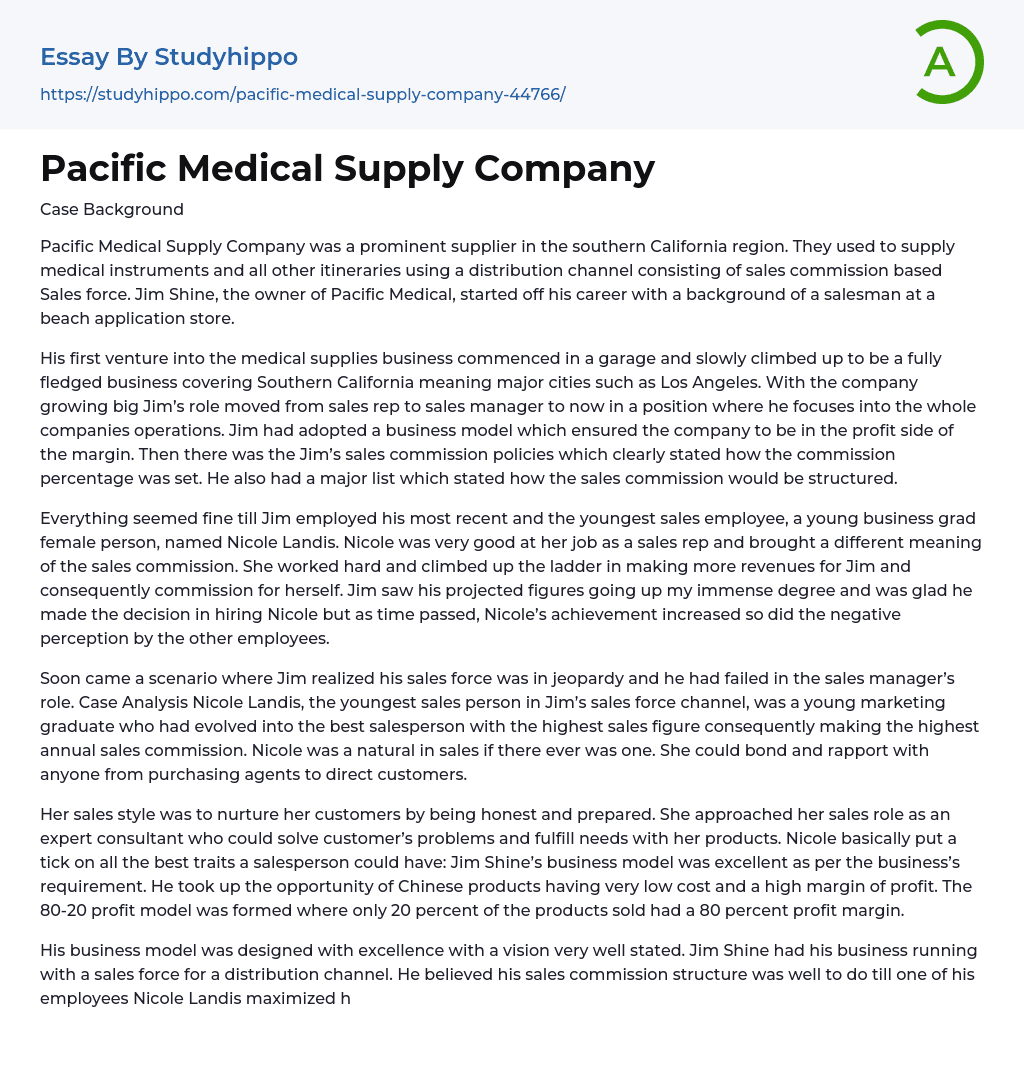Case Background
Pacific Medical Supply Company was a well-known provider in southern California. They specialized in supplying medical instruments and other items through a distribution channel that relied on a sales force compensated by commissions. The owner of Pacific Medical, Jim Shine, had previously worked as a salesman at a beach application store.
Jim began his medical supplies business in a garage and expanded it to encompass significant cities in Southern California, including Los Angeles. As the company flourished, Jim's responsibilities shifted from being a sales representative to becoming a sales manager, and currently he supervises all aspects of the company's operations. Jim introduced a profitable business model and established explicit commission policies detailing the percentage of commission for sales.
Despite having a well-structured sales commission plan, Jim encountered a challenge
...when he hired Nicole Landis, a recent young business graduate. Nicole proved to be exceptionally skilled as a sales representative, bringing a fresh perspective to the concept of sales commissions. Through her hard work, she rapidly increased Jim's revenues and subsequently earned higher commissions for herself.
Jim was happy with the increase in his projected figures and attributed it to his decision to hire Nicole. However, as time went on, the other employees began to perceive Nicole's success negatively. This eventually led to a situation where Jim realized that his sales team was at risk and that he had failed as a sales manager. Nicole Landis, the youngest member of Jim's sales force, started out as a marketing graduate but quickly became the top salesperson with the highest sales figures and commission. Nicole had a natural talent for sales.
Nicole possessed the ability to establish connections and understand
others, regardless of whether they were purchasing agents or direct customers. Her approach to sales involved building trust and readiness. She viewed herself as a knowledgeable advisor, capable of addressing customers' issues and meeting their needs with the products she offered. Essentially, Nicole embodied all the desirable qualities of a salesperson, aligning perfectly with Jim Shine's exceptional business model that met the company's specific needs.
Jim Shine capitalized on the opportunity presented by inexpensive Chinese products, which allowed for a significant profit margin. He developed a business model based on the 80-20 principle, where only 20 percent of products sold yielded an 80 percent profit margin. This model was carefully crafted to achieve excellence and had a clearly stated vision. To facilitate distribution, Jim had a dedicated sales force. He believed his sales commission structure was adequate until one of his employees, Nicole Landis, surpassed all expectations and exposed flaws in Jim’s commission system. It became evident that Jim had set attractive commission percentages for high quantities of products sold, assuming that no employee would surpass those sales targets.
Jim Shine did not understand the significance of a sales manager's role in maintaining a well-balanced sales force. He was impressed by Nicole's outstanding performance, which led to higher profits. However, Jim neglected his responsibilities as a sales manager, undermining the effectiveness of his entire sales force and weakening the company's overall alignment.
Case Conclusion
To address this issue, Jim Shine should focus on improving his role as a sales manager and creating stability within his sales force.
He needs to assess Nicole's situation and make a viable decision that allows him to keep his top employee. He should
determine if he is capable of fulfilling the role as sales manager or if he should seek a new manager. He should explore ways to instill the qualities exhibited by Nicole in the rest of his employees. He should find a way to strike a balance between promoting Nicole to manager or completely revamping his sales commission structure.
- Chief Executive Officer essays
- Convenience Store essays
- Firm essays
- Training And Development essays
- Unilever essays
- Variable Cost essays
- Virgin Group essays
- Bargaining essays
- Entity essays
- Pest analysis essays
- Bankruptcy essays
- Earnings essays
- Tata Group essays
- S corporation essays
- Secretary essays
- Premise essays
- Advertising essays
- Audience Theory essays
- Competitor Analysis essays
- Consumer essays
- Marketing Management essays
- Marketing Mix essays
- Marketing Plan essays
- Marketing Research essays
- Marketing Strategy essays
- Point Of Sale essays
- Price essays
- Procurement essays
- Product essays
- Product Differentiation essays
- Promotion essays
- Promotion And Marketing Communications essays
- Retailing essays
- Trademark essays
- Anheuser-busch essays
- Brands essays
- Detergent essays
- Product Placement essays
- Research Design essays
- New Product Development essays
- Advertisement essays
- Brand essays
- Sales Promotion essays
- Advertising campaign essays
- Consumer behaviour essays
- Offer And Acceptance essays
- Wal-Mart essays
- Discover essays
- John Locke essays
- 9/11 essays




